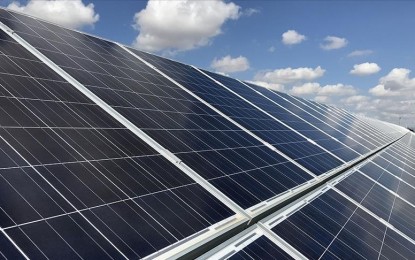
ISTANBUL – Global progress on energy efficiency is well short of what is necessary to help put the world on track to reach net-zero emissions by 2050 despite a recovery this year to a pre-pandemic pace, the International Energy Agency's (IEA) report Energy Efficiency 2021 revealed Wednesday.
Reaching international climate goals to limit the global temperature increase by 1.5 degrees Celsius requires a rapid expansion of technologies and solutions that drive more efficient use of energy across the economy, according to the report that is urging governments to take the lead in mobilizing an increase in the required investments.
Government policies are expected to help energy efficiency investment rise by 10 percent this year to almost $300 billion.
However, total annual investment in energy efficiency globally needs to triple by 2030 to be consistent with a path towards reaching net zero emissions by 2050, the IEA said.
The report found that approved energy efficiency spending by governments is regionally unbalanced, as the majority of the spending comes from advanced economies.
The IEA said governments elsewhere have considerable potential to use recovery packages to boost spending, which would add 4 million more energy efficiency jobs by 2030 and promote economic growth.
"We consider energy efficiency to be the 'first fuel' as it still represents the cleanest and, in most cases, the cheapest way to meet our energy needs. There is no plausible pathway to net-zero emissions without using our energy resources much more efficiently," IEA Executive Director Fatih Birol said. "A step change in energy efficiency will give us a fighting chance of staving off the worst effects of climate change while creating millions of decent jobs and driving down energy bills."
According to the report, the rate of improvement in global energy intensity, a key indicator of how efficiently the world's economic activity uses energy, is expected to recover in 2021 to 1.9 percent.
This follows the worst year in a decade in 2020 when the coronavirus disease 2019 (Covid-19) pandemic shifted the center of economic activity away from services and towards industry.
"This is in line with the average annual rate of improvement over the past 10 years but well below the 4 percent needed between 2020 and 2030 in the IEA’s pathway to net zero emissions by 2050," the report said.
The agency found over the past five years that energy intensity has improved on average by 1.3 percent a year, down from 2.3 percent between 2011 and 2016.
It said that in addition to well-developed energy efficiency policies, such as appliance standards, digital technologies will play a significant role in energy efficiency's future as the rapid uptake of digitally connected devices is helping to expand the scale and scope of benefits from energy efficiency and can deliver a cheaper and easier clean energy transition. (Anadolu)
